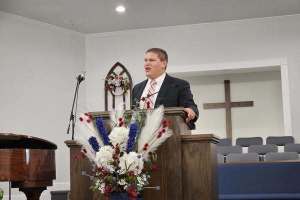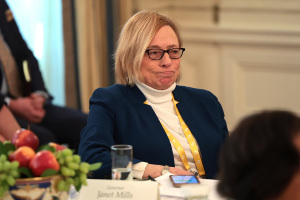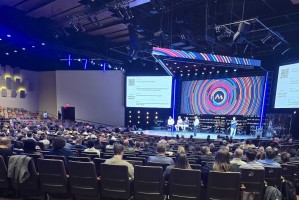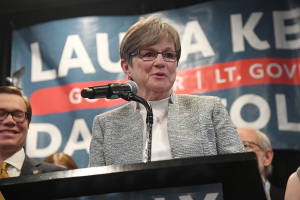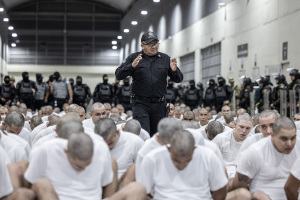Emmy Award-Winning TV Show Commemorates the Pro-Life Message of Memorial Day

America marks Memorial Day this weekend, a federal holiday originating after the Civil War to remember and appreciate the sacrifice of those who have died defending our nation. Only days ago, on May 21, the lesser-known Armed Forces Day gave honor to service members and their families currently serving within the various branches of the U.S. military.
In their sacrifice, one prominent pro-life leader finds a clear message to inspire the advance of life and liberty through policies that defend the innocent. Brad Mattes, President of Life Issues Institute based in Cincinnati, Ohio, hosts Facing Life Now — an Emmy Award winning TV show that recently transitioned to an online series.
Mattes revealed in a recent interview how many channel-surfing viewers landed on his team's pro-life TV show.
"It's not an accident when people are impacted in life-changing ways — it's God directing people," he notes. "Even if the show saved one baby, it would be worth it. We are fortunate to know that God has used it to save more than that, and we're likely unaware of many more."
Continuing our dialogue, Brad Mattes speaks of his son's service in the military, how to tell stories people relate to … and what drives him to create media revealing the value of every life. All 165 episodes of this pro-life documentary series are now available free on YouTube, along with new videos from the ongoing web show Facing Life Now.
Bound4LIFE: Facing Life Now covers a broad spectrum of issues — from special needs children to international aid. Has the show always had such a broad view of pro-life issues?
Brad Mattes: The show is broad, but we do stick with the life issues. For example, caring for Down Syndrome children is a passion God has placed on my heart, and several programs showcase how those dealing with this difficulty are a blessing to everyone around them.
Where we perhaps strayed a bit from our core focus was in my all-time favorite program called "A Lifetime Sacrifice," a two-part episode honoring the heroes we lost in combat and their families who sacrifice so much. It fits our larger theme because they are defending the most important right of all — the right to life.
I interviewed a young widow who had lost her husband in battle, then found out four days later she was pregnant with their child. We talked about the blessing her child is in her life. I spoke to a mother who, on her birthday, got word that her son had died in combat. Behind the scenes, people were praying I wouldn't break down sobbing on camera; I came close several times.
With my own son having served in Iraq, honoring our troops is very important to me. My son was deployed to Iraq for a year; now he is back stateside and going to college. People don't realize what they go through, it truly is a lifetime sacrifice.
Any time I can reach out to a soldier — in an airport, wherever — and thank them for their service, I count it a privilege. These men and women are taking many months, often longer, apart from their families to be in harm's way. And they're getting paid peanuts to do it! It really shows their passionate dedication.
Bound4LIFE: Could you share a little about your family — how does being a husband, father and grandfather factor into your work?
Brad Mattes: My wife Ellen is a great support to me in this work. I did a lot of travel in the early days when the children were small. She not only held down the fort, she nurtured the kids and juggled many things with such love and care. I couldn't have done it without her.
We have four sons, and four grandchildren — two that are living. There were identical twin boys that were lost during pregnancy about three years ago; we look forward to meeting those two in Heaven.
My involvement in the pro-life movement started very young. As a senior in high school in Billings, Montana, I gave a persuasive speech on the issue of abortion. I took a poll of the class before I spoke; their views on abortion were about 50-50.
Using materials from Dr. John and Barbara Willke, I showed my classmates the beauty of the unborn child, showed them what abortion does to the babies — graphic images which reveal the reality of what happens —then shared about the positive alternatives of adoption and foster care.
Afterward, I took the same poll of the class and it was unanimous for life. So I learned early on that pro-life education, presented in a way your audience can accept it, digest it and grow from it, is the way to be.
My passion for pro-life education only grew, and I had the opportunity to work with Dr. and Mrs. Willke for 24 years here at Life Issues Institute. I learned a lot. They always showed me that you have to watch and be aware of how your audience is consuming information. This spring marked one year since John Willke passed away.
Bound4LIFE: When you look back on the show's first season, what are the big changes you notice in terms of the production and storytelling?
Brad Mattes: We got a chuckle out of several things when we did the series finale, which features clips from the past eight seasons. I jumped into this with absolutely zero experience in TV, only with a feeling that this was where God was leading us.
There are subtle changes on the production side: the music, lighting, cameras — we have gained better equipment along the way. We went to high-definition exclusively, a big step forward. With that came the experience of our crew, which resulted in better storytelling. We were led to a production company here in Cincinnati called Zone Communication Group, founded to promote and help people share conservative and Christian viewpoints.
God really put all these pieces together, otherwise we couldn't have raised the budget necessary to produce Facing Life Head On. A standard production cost for a program like this is hundreds of thousands of dollars; we have spent far less, and obviously multiple Emmy Awards speak to the quality of the work.
The team at ZoneCG deserves as much credit as anyone involved for the success of it. They are also producing our short videos for the new online series Facing Life Now.
Bound4LIFE: There are many pro-life advocates who seek to chronicle real-life stories in compelling ways. From your decade of experience, what are some pitfalls to avoid in interviews and citizen journalism overall?
Brad Mattes: You need to have discernment and savvy to know who your audience is. Then you need to determine how you can effectively speak to them — to touch their hearts and minds. It may not be by expressing yourself as you love to express yourself; you need to speak in a way they can hear it.
With this pro-life TV show, we targeted our audience to be women of childbearing age who weren't necessarily with us on being against abortion. We presented a story and let guests persuade the viewers on the specifics of valuing life.
We interview people who make good choices, and bad choices — talking about the consequences of each. We've spoken to women who had abortions, birth mothers who placed their babies for adoption, couples who decided to adopt late in life … we have covered a variety of issues during eight seasons on the air.
It's not rocket science: life is good, death is bad. It matters how you present it though. We always work to have guests who can relate to the viewers we are targeting.
Bound4LIFE: How does this approach affect the way Facing Life Now addresses matters of faith?
Brad Mattes: I firmly believe that within the covers of the Bible are the answers to all of man's problems. I also believe it's the final authority, that nothing supersedes the scripture. That is a message to lead with strongly in the pulpit, pairing such truth with the beauty of redemption and forgiveness.
The approach of our show is softer, to appeal to a wide audience. If you open a fire hydrant, gushing all the Gospel message you can at someone at one time, it will drown them. Give it to them in a way they can accept it and take it in — then it can nourish their spiritual bodies and help them along.
Sometimes when we have an overtly religious guest, we tell them: For the target audience of this show, we'd prefer that we not hit them over the head with Bible verses and language that would overwhelm them.
You have to change the packaging of a message with the venue so it can meet the people where they are; then they can take it in, learn from it, and perhaps change their hearts and minds.
Sometimes that involves a follow-up activity. We have a website with resources, so after every program viewers have a way to contact us — or, more importantly, the guests on the program — so they can follow-up and provide counsel.
We're not always talking to people of faith who believe as we do. We have to be able to speak to a world that is hungry for bread, but just doesn't know where to find it.
















